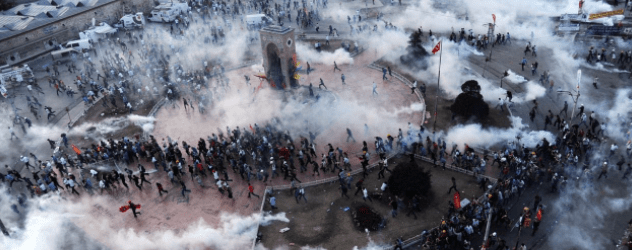By Ali Cevahir in Turkey
We should always be suspicious about political leaders who say, “we are all in the same boat” and that applies in Turkey as much as anywhere else.
To understand the Turkish of regime of Erdoğan, one should go back to the 2002 election, which the AKP won, but with only the 34.4% of the vote. Amid allegations of corruption and economic crisis, the previous president, Bülent Ecevit, was discarded, and there was an electoral wipeout of his party, which lost all of its MPs.
Since the election, all the cards have been shuffled in favor of Erdoğan’s party, the political representatives of Turkish monopoly capital. In 2010, Erdoğan introduced sweeping constitutional changes to give himself, as president, more powers and to undermine the power of the Turkish parliament. At that time, many liberals and even left-liberals backed the constitutional changes, believing it meant more democracy, but there can be no real ‘democracy’ from the reactionary forces within this government, allied by religious capital, and big business.
The Gezi Park uprising in 2013
A break in the political situation came in 2013 with the so-called Gezi Park uprising in Istanbul. It was a movement of opposition not only to Erdoğan and his party, but also the modest opposition of other parties. The Gezi protests included many workers, unemployed, disabled, students, women and LBGT-Q: all of those who are under particular pressure from the religious right.

But the limitations of recent opposition of political parties were that its common denominator seemed to be opposition to Erdoğan himself and in favour of a parliamentary system rather than a presidential one. In fact, many of the leading figures of this opposition movement are themselves a political nightmare for the working class. There was, for example, Ahmed Davutoğlu, an ex-prime minister, who was the founder of imperialist project called New Ottomanism. He still has the blood of millions on his hand. There was also Ali Babacan, a neoliberal economist, who has undermined the rights that workers had gained through struggle over many years.
It is not just a matter of opposing Erdoğan, but also the big capitalists who have backed him. Even after the failed military coup of July 2016, Erdoğan reminded big capital that he was and will be the only insurance they have for their profits. Part of the state of emergency imposed afterwards included a ban on strikes.
Erdoğan sees his own interests as tied up completely with capitalism. In one of his speeches, he complained to big business, “We immediately intervene against strikes to support you, so what and who else can serve better than we do?” Erdoğan was trying to persuade his masters that no one can serve them better than he has done.
Erdoğan pandemic policy followed Boris Johnson’s
When it came to the Covid pandemic, Erdoğan followed his role model, Boris Johnson, in following a herd immunity policy, although in words Erdoğan claimed to be different, although this was just for show. In the care of the elderly, for example, officials sent to them in the first months of the pandemic was a bottle of cologne and three cheesy face masks, which were not even up to EU standards.
The Turkish health system is based on private hospitals and profit. Even before the Covid outbreak, patients who did not really need intensive care were sometimes being hospitalized in private hospitals, just so as to increase profits. An intensive care bed in a private hospital is sometimes being paid for many times, over by social insurance institutions. Private hospitals have a vested interest in health care units for their own profits.
During the pandemic, the “economic support” that the government has put into action is a short time working allowance, which means only half-pay, ie for 15 days a month, through social insurance. This was funded by depleting the workers’ unemployment funds, so in the future, workers are going to be paid less if or when they became unemployed.
All the big business sectors have maximized their profits during the pandemic and have taken full advantage of government policies. While white-collar workers can still work full-time from home, their insurance fund was being cut and 40% of their salaries were paid by the national treasury, which again meant the exploitation of working people. For industrial workers, on the other hand, Turkey has been in the forefront of not shutting down industries, so blue-collar workers have been working under pandemic conditions. As a result, cities with big factories have the highest rates of infections.
Industrial workers labour under pandemic conditions
During all this time, the government has not supported small businesses, a policy that has hit the support on which Erdoğan’s AKP party rests. Many small businesses in Turkey, called esnaf, are semi-lumpen, in the sense of their right-wing individualistic, “spirit” and having a petit-bourgeois outlook. Their traditional support for the AKP is in a fashion similar to the peasants’ support to Bonapartism, but this former relationship now seems to be breaking down, and Erdoğan is operating more openly in the interests of big capital.
To all appearances, in the first three months of the pandemic, the population was relatively passive in the face of a highly pathogenic virus. But as the crises deepens the political maneuverers of the regime will be more limited. Their promises will increasingly look like a “lost paradise”.

For many poor people, religion is still a powerful ideological instrument, but it is a fragile one. Religious officials have even complained in the last five years about the increasing number of ‘atheists’ among the younger generations. When it comes to the middle class within the bureaucracy and the army, Turkish nationalism is also still strong, but that, too is an illusion. All the flag-waving has achieved has been a few olive trees and a small parcel of land in Western Syria. Turkish imperialism, not only the military power but also the capitalist investors, was daydreaming of great gains during the first few years of civil war in Syria, but now they do not even mention it.
AKP voters have become poorer
The liberals and middle class – the main voting reservoir of the AKP – are now withdrawing their support from Erdoğan, as they have become poorer. In rural areas there are still many who support both AKP and MHP nationalists. But those farmers who the AKP has ruined by expropriating their lands, (at the behest of IMF and WTO), are turning against the government. The mass support on which AKP relied in the past seems to be rapidly eroding, as farmers, small businesses and students are all burden with debt. They will pull the plug completely, sooner or later.
After the last local elections, the opposition HDP won control of 68 towns and cities across Turkey, but the government got around this expression of opposition by taking over the administration of these towns illegally, and in many cases sending elected mayors to jail. This violation of democracy, we might add, has been completely ignored by the newspapers of the western capitalist states, largely because of their support for the Turkish regime.
Erdoğan the great ‘Ottoman Sultan’
Erdoğan styles himself on the figure of Sultan Abdülhamid, the nineteenth century Sultan of the Ottoman Empire, who was known for twice shutting down the constitution, banning freedom of speech, and policing the society with his agents. He also murdered opponents, committed mass murder of non-Muslims, triggered clashes between nationalities, made alliances with imperialist powers and reactionary religious powers, such as religious sects and feudal landlords, and so on, and so forth.
Erdoğan’s AKP-MHP coalition has violated the rights of workers, waged war within and beyond the country, forcibly repressed religious minorities and women, and threaten the opposition with mafia gangs, and hoodlums. But as Erdoğan and his coalition increasingly lose their legitimacy, and their mass base of support, they will also lose their credibility within the global capitalism.
There is also the spectre of Gezi Park haunting Turkey. The spirit of that movement is a nightmare for the government and its pseudo-opposition. An old Leonard Cohen song has the lyrics “everybody knows that the captain lied”. While all the various governments continue to claim that “we are all in the same boat,” millions are beginning to realise we are not even on the same floor, let alone the same boat.



